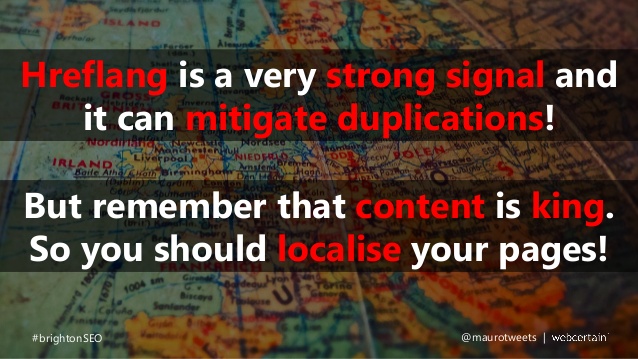
Looking to spread into nascent markets? Before you do anything, you should look at your hreflang. Your international SEO is crucial for tapping new markets, and hreflang is the cornerstone of that. Mauro Cattaneo broke it all down for us at this April’s BrightonSEO.
Overview
- Speaker: Mauro Cattaneo
Company: WebCertain
Website: https://webcertain.com/
Twitter: @maurotweets
Linkedin: https://www.linkedin.com/in/mrcattaneo/
Slides:
What was the talk about?
International markets are growing rapidly, presenting a valuable opportunity for brands to get exposed to an entirely new consumer base. Indonesia and Latin America are two examples of rapidly-growing markets that brands have their eyes upon.
Hreflang is key to cracking these international markets, swapping out your local URLs with language/country-appropriate ones. When it comes to international SEO, hreflang is not a new challenge. It’s fairly common, and with due cause. Hreflang can make (or break) your attempts at reaching your target market internationally.
Hreflang can be managed in one of three ways: XML sitemaps, HTTP headers, and HTML tags (in order of preference). There’s less superfluous code in the <head>, you get faster loads times, plus you’re less likely to have problems when search engines try to read the hreflang.
An Italian’s guide to hreflang @maurotweets @WebCertain #Brightonseo pic.twitter.com/rxzQe8Qj3l
— Gemma Houghton (@GemHoughton) April 12, 2019
Quote
“Hreflang is a common challenge in international SEO, but for a good reason. It can make the difference between success or failure in reaching your target audience around the world.”
Potential impact on the industry
As Brexit draws ever nearer, UK-based brands will want to spread their reach further to find new, untapped opportunities. But with new opportunity comes new challenges, foremost amongst them being hreflang. Get your hreflang right, and you’ll be on your way towards conquering new, emerging markets.

Key takeaways
- Screaming Frog is useful for highlighting major hreflang errors, but most can only be found through some serious legwork.
- Hreflang is a strong signal to search engines, and it can alleviate duplications.
- Content is still king internationally — localise your pages!
